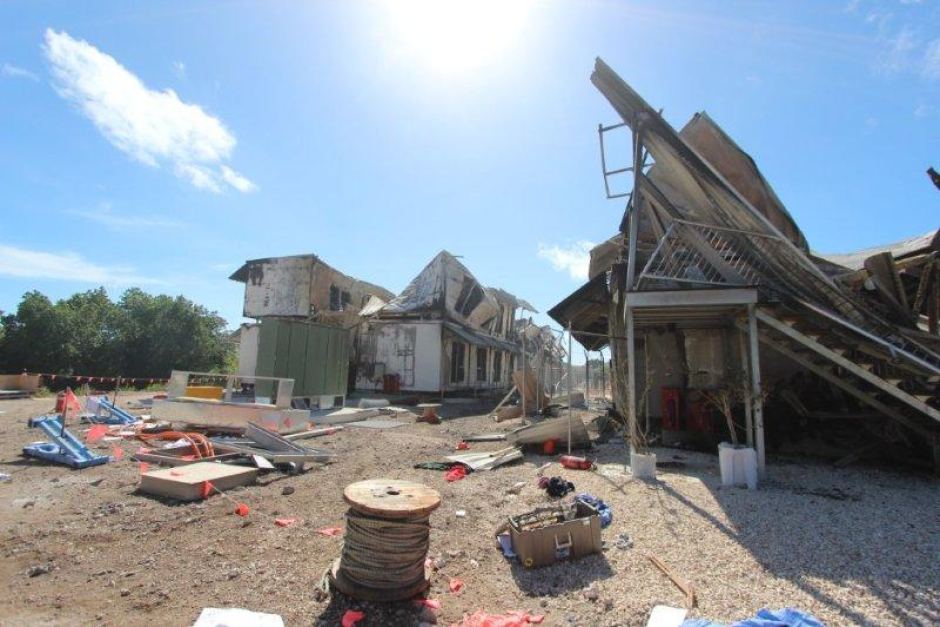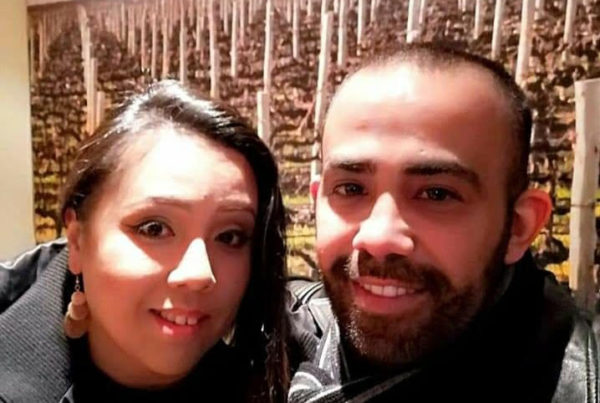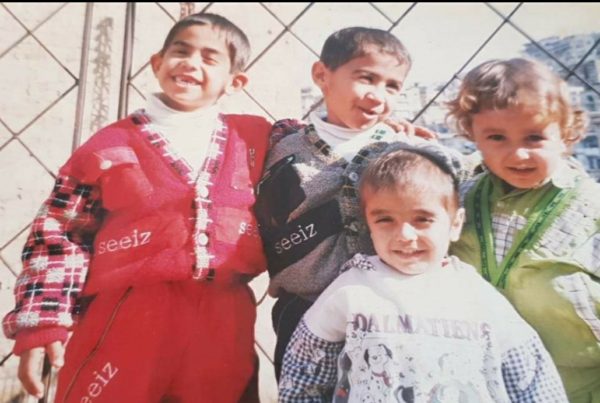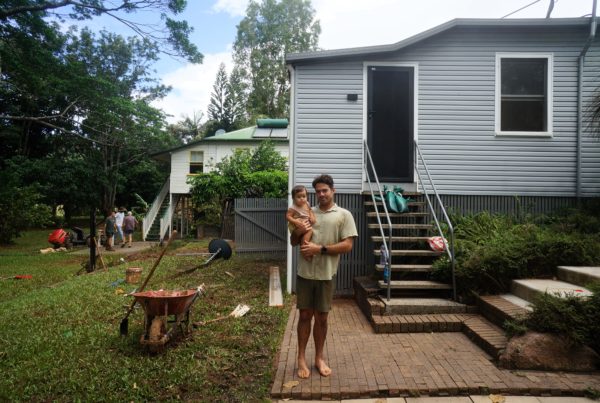
This extract from my second book, Nauru Burning, describes the days after the 2013 riot that destroyed much of the Nauru regional processing centre. It was first published in The Vocal.
The makeshift compound dubbed the ‘Dog Pound’ was marked out by temporary fencing among the rubble of old phosphate mines, the smouldering centre within eyesight. All that remained of the ‘state of the art’ facility was ash and embers and twisted metal. Men were lying on tarps, bags, newspaper, cardboard, and whatever else they could collect of their property before the camp was destroyed. The heat was unbearable, the strength of the sun unrelenting, and very few could find cover in the small amount of shade created by the remaining tarpaulins. There wasn’t enough space in the area marked out by security where over 300 men were expected to sit and wait, so they were forced to lie on top of each other despite the heat. Men were dehydrated and sunburnt, exhausted by the sun and the events of the previous night. Drinking water was rationed by security staff. There were no showers and the toilets were filthy and couldn’t be flushed due to lack of water. Men resorted to defecating and urinating in plain sight. There were no resources or facilities to offer the men, it had all been burnt down. Staff were not allowed to offer the men basic supplies purchased with their own money from the main store in town. Food was served: barbecued sausages on pieces of bread.
The horrific conditions and the humiliation on the men’s faces were reflective of a sombre, post-fire depression. One man described it as ‘an African slum mixed with an apocalyptic, end-of-world scenario’. Trenches had been dug in the compound and between those trenches there was a narrow walkway for people to move about on. Wilson Security guards would not allow the Salvo welfare teams to approach the men. Instead the Salvos had to sit on chairs in the corners of the compound and talk only to those men who approached them, but no-one wanted to talk. The Salvos were resigned to sitting in one spot and smiling and making friendly eyes at the men. Any sign of intimacy could be used as evidence of sympathising. Suspects who couldn’t be taken to prison due to the overcrowding of cells were sat in the corner of the Dog Pound. They weren’t allowed to move and had separate security to the rest of the men. They couldn’t talk to the other men, the other men couldn’t talk to them, but they could see each other.
‘We have the power, we make the decisions,’ a guard said. ‘You have a problem, talk to DIAC.’
The suspects were eventually taken to the prison.
The area was tightly managed by security. Everyone sat in plain view of the guards and there were regular head counts. Many men felt that the security guards had become aggressive towards them, irrespective of their involvement or lack of involvement in the incident. The Wilson Security guards had been through a traumatising night as much as anyone on the island and it’s possible that they felt betrayed by the men and were allowing it to manifest in their behaviour.
The men in the Dog Pound were suffering from shock; no-one had slept, most of their property had been destroyed. Their ‘home’, such as it was, was gone. For Viji there had existed a strange sense of pride in their prison. He had suffered through tents and squalid conditions to finally be provided with new buildings. The rooms were airy and private and personalised with photos and messages from loved ones; the mess hall was two days old; the buildings were supposed to be fireproof. Many of the men were expecting final decisions on their RSD in the next weeks, yet the actions of a few had returned the majority to the bottom of the pile.
The men were told that the medical facilities had burned down. They were given Paracetamol for all ailments, although this level of medical treatment was nothing new to them. Some men with serious injuries were sent to the Nauru hospital, but not all were so lucky. An Iranian man with cuts under his eyes, an Iraqi with a deep cut under his foot, and one Tamil man who was beaten so badly he couldn’t go to the toilet by himself were not sent to the hospital.
Then the rain set in and the trenches became muddy and it looked like a prisoner-of- war camp. One of the tarpaulins was torn and the Tamils sitting underneath slowly got soaked to the bone.
‘Can you fix it?’ they asked a Salvo, but nothing could be done.
Some of the men spotted some plastic bags caught up in the scrub outside the compound that could be used as makeshift raincoats but they were not allowed to get them. One Salvo smuggled the plastic bags in for them.
After just two hours the workers in the Dog Pound were exhausted. Work in the Nauru RPC was already draining enough, and the atmosphere inside the Dog Pound was intensified further still by the cramped conditions and the suffocating, claustrophobic hopelessness. Shift work was reduced from ten to six hours to accommodate for the heavy emotional toll on employees. Even then many workers felt themselves breaking down under the pressure of working in what some believed to be a military camp of prisoners and hostages, where people were treated as criminals.
Nights in the Dog Pound were empty of sleep and days were full of boredom. In those days, Baqir felt that the behaviour of the Wilson Security and Nauruan Sterling guards changed. The way they looked at him made him feel like a dog. He felt had they been given the opportunity they would have killed everyone there. To any request or complaint, security pointed at the wreckage and replied, ‘You had everything and you burned it down.’
Baqir wanted to die there; he wanted to stop living. ‘Everything I had ever suffered and lived before, it was in front of my eyes.’
His bright future was destroyed. He said to the security guards:
‘If you think someone was involved in this incident you can punish them, put them in jail, put everyone you think is guilty in jail, but stop doing it like this: don’t punish everyone.’
The men remained under open skies for four days until they were transferred to the new processing centre.


